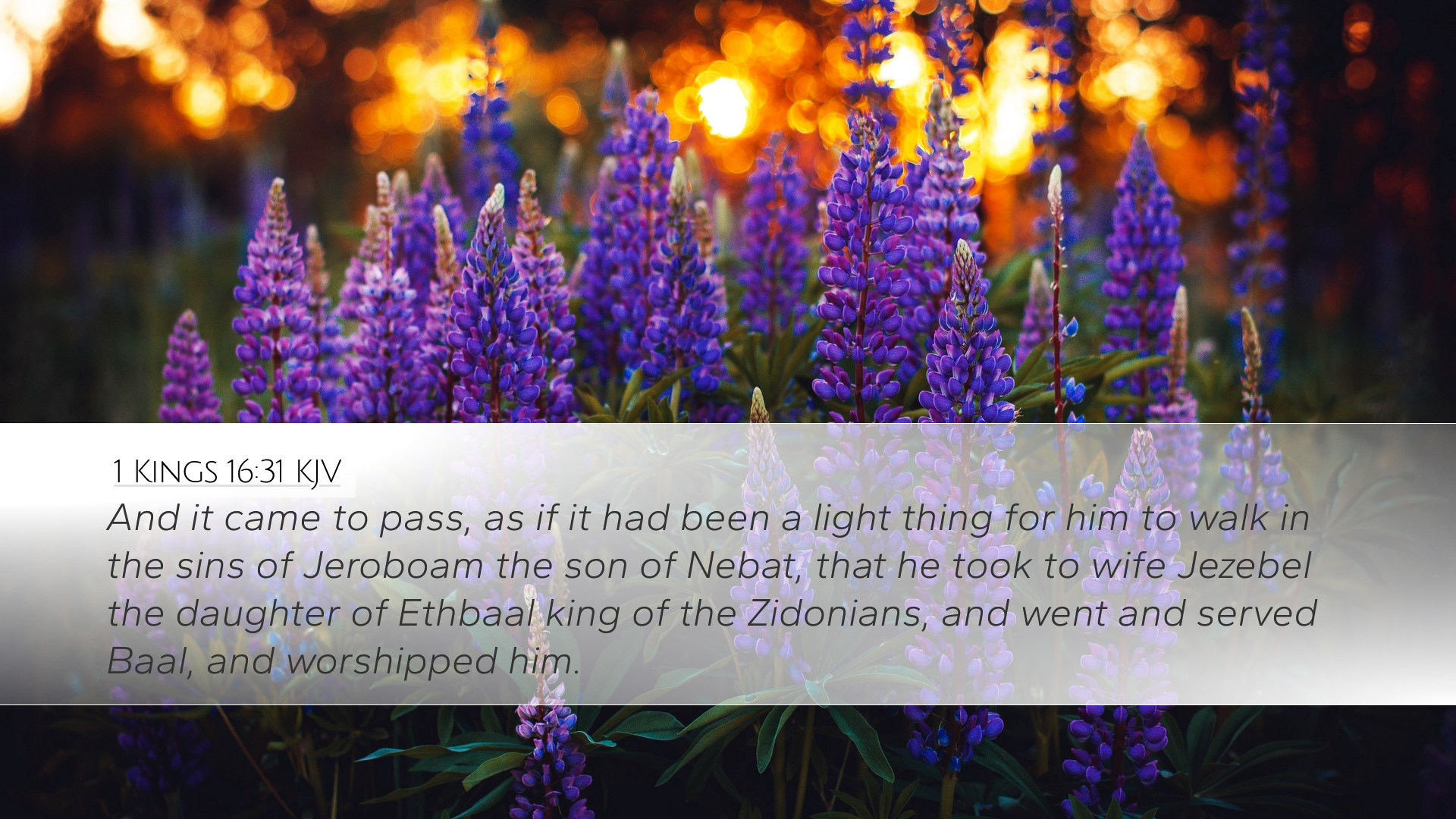Commentary on 1 Kings 16:31
Text of 1 Kings 16:31 (KJV): "And it came to pass, as if it had been a light thing for him to walk in the sins of Jeroboam the son of Nebat, that he took to wife Jezebel the daughter of Ethbaal king of the Zidonians, and went and served Baal, and worshipped him."
Introduction
The historical narrative of 1 Kings reveals a tumultuous period in Israel’s spiritual journey, marked by political intrigue, idolatry, and the challenge of remaining faithful to Yahweh. In this particular verse, we witness the alarming decision of King Ahab that not only signifies a personal choice but a national crisis.
Exegesis of 1 Kings 16:31
This verse encapsulates Ahab’s actions and choices that led Israel further away from God’s covenant. His decision to marry Jezebel, a foreign princess and a devotee of Baal, was pivotal. It indicates his willingness to integrate pagan worship into Israelite life, signaling a profound deviation from the path of righteousness.
Jeroboam's Legacy
- “Walking in the sins of Jeroboam”: Jeroboam, the first king of the northern kingdom of Israel, established a pattern of idolatry that Ahab followed. This phrase denotes not merely a repetition of sin but a categorical embrace of idolatrous practices.
- Idolatry's Impact: The reference to Jeroboam indicates the systemic nature of disobedience entrenched in Israel. Ahab’s minimal regard for these sins denotes a lighthearted attitude towards rebellion against God’s commandments.
Jezebel's Influence
- “Jezebel, the daughter of Ethbaal”: The introduction of Jezebel, a Sidonian, signifies an alliance motivated by political considerations but laden with spiritual consequences. Ethbaal, her father, was a priest of Baal, which highlights the risks inherent in such alliances.
- Cultural Tensions: Jezebel’s worship of Baal and her influence in Israel fostered a systemic clash between the worship of Yahweh and paganism, leading to significant societal shifts. Ahab’s marriage to her demonstrates a capitulation to foreign influence at the expense of Israel’s covenantal identity.
Turning to Baal
- “Went and served Baal”: This phrase illustrates not just a superficial acknowledgment of Baal but signifies a deliberate act of worship that shifted national allegiance. Ahab’s actions indicate a pivotal moment in which state and religion blurred, leading Israel further into idolatry.
- Consequences of Idolatry: The narrative foreshadows a series of divine judgments that follow Israel’s idolatry, manifesting God’s displeasure toward His people’s unfaithfulness.
Theological Insights
From Ahab's actions, several theological themes emerge, significant for pastors, students, and theologians alike.
- The Danger of Compromise: The act of marrying Jezebel highlights the perilous nature of blending faith with secular influences. Ahab’s failure serves as a warning against compromising holiness for political or personal gain.
- God’s Sovereignty and Judgment: Ahab’s embrace of Baal worship leads to a national crisis, ultimately drawing the judgment of God upon the land. The narrative underscores that God remains active in history and responds to the disobedience of His people.
- The Role of Leadership: Ahab’s influence as king illustrates the significant impact of leadership on the spiritual direction of a nation. His failure intimately connects with the broader consequences for Israel, reminding leaders of their divine responsibilities.
Application for Today
This verse serves as a reflection and admonition for contemporary believers and leaders. The dynamics observed in Ahab's reign are still palpable in modern society, where idolatry may manifest in various forms—materialism, secularism, and relational compromises.
- Vigilance in Leadership: Leaders today must strive for integrity and confront the pressures that may lead to spiritual compromise, recognizing the profound impact such choices can have on their communities.
- Rejecting Idolatry: Individuals must be vigilant against the subtle influences of culture that may lead them away from genuine worship. Like Ahab, the temptation to integrate worldly practices into faith can lead to detrimental consequences.
- Faithfulness to God: The call to remain faithful to God and avoid the pitfalls of idolatry is paramount. Believers must earnestly seek God and prioritize their relationship with Him above all else, understanding the rich heritage they inherit through Christ.
Conclusion
The passage of 1 Kings 16:31 is a sobering reminder of the complexities of faithfulness in leadership and the dangers of idolatry. Ahab's choices echo through the ages, providing lessons on the impacts of cultural integration and the importance of remaining steadfast in the worship of Yahweh.


